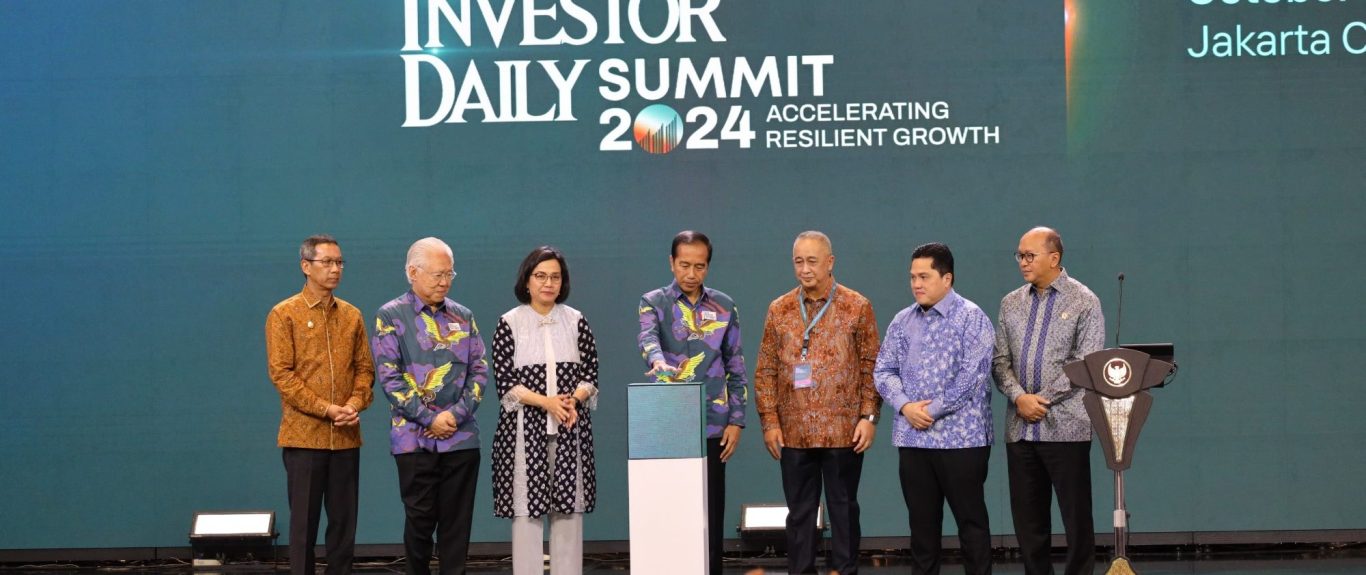BNI Investor Daily Summit 2024
Photo Credit: infopublik.id
Indonesia finds itself at a critical juncture as it seeks to balance its economic ambitions with the realities of a rapidly changing global landscape. October’s BNI Investor Daily Summit 2024 in Jakarta brought together key figures in economics and policy to discuss the nation’s trajectory amidst geopolitical tensions, climate change concerns and the ongoing US-China trade dispute.
Former President Joko Widodo set an optimistic tone, predicting that Indonesia’s GDP per capita will surpass $7,000 in 2029 and reach $9,000 in the next decade, with current GDP per capita standing at $5,060. He believes the importance of maintaining economic growth above 5 percent to help Indonesia achieve developed nation status. Widodo suggested promoting labor-intensive sectors like agriculture, maritime industries, and food production to enhance value, highlighting potential in coffee, cocoa, pepper, and seaweed processing.
The smooth transition of power to President Prabowo Subianto is fostering optimism for economic prospects. Subianto's economic vision marks a significant shift towards a more inclusive and interventionist approach. Rejecting trickle-down economics, he aims for an ambitious 8% growth rate while prioritizing wealth distribution and poverty eradication. His strategy blends socialist principles with pro-business policies, including plans for a free meal program and large-scale housing projects.
However, challenges loom on the horizon. Former trade minister Mari Elka Pangestu highlighted the dual threats of geopolitics and climate change to Indonesia's fiscal stability. She emphasized the need for Indonesian companies to adapt to increasing pressure from climate risk assessments and ESG requirements to remain competitive in global supply chains. Pangestu also warned of potential commodity price shocks due to escalating conflicts and rising oil prices, posing a challenge for Indonesia's heavily subsidized fuel system.
The ongoing US-China trade tensions present both challenges and opportunities for Indonesia. Pangestu stressed the importance of diversifying trade partners amid the partial decoupling of the world's two largest economies. This situation requires a delicate balancing act in maintaining relationships with both superpowers, given Indonesia's significant trade and investment ties with both the US and China.
Professor Justin Yifu Lin drew parallels between Indonesia's and China's economic aspirations, with both countries aiming to become developed nations by their respective centennial anniversaries. Lin's optimism about China's economic trajectory suggests potential benefits for Indonesia as China's largest trading partner and second-largest source of foreign direct investment.
Finance Minister Sri Mulyani Indrawati provided a more optimistic view of Indonesia's economic resilience, pointing to the country's success in maintaining stability despite numerous challenges over the past decade. She highlighted the government's focus on infrastructure and human development as key factors in this stability, while emphasizing the need for selective and responsible state spending.
Investment Minister Rosan Roeslani emphasized that the country's commitment to peace and stability is the main factor attracting foreign investors to Indonesia. This stability, even during government transitions, is crucial for fostering significant investment growth in the future.
In the realm of natural resources, Energy Minister Bahlil Lahadalia defended Indonesia's nickel ore export ban as crucial for the green energy transition. Despite objections, including a WTO dispute, Lahadalia emphasized the ban's economic benefits, with nickel ore export value rising significantly in recent years. This policy underscores Indonesia's commitment to developing an integrated EV battery ecosystem and leading the global market in nickel derivative exports.
As Indonesia stands at this critical juncture, the nation faces a complex set of challenges and opportunities. The incoming administration's ambitious goals, coupled with the country's commitment to stability and sustainable development, position Indonesia for potential significant economic growth. However, navigating the intricate global landscape, addressing climate change concerns, and balancing domestic needs with international expectations will require careful policy-making and strategic planning. The success of Indonesia's economic transformation will depend on its ability to adapt to global pressures while leveraging its unique strengths and resources. As the world watches, Indonesia's journey towards becoming a developed nation by 2045 will be a testament to its resilience, innovation, and ability to harmonize diverse economic approaches in an increasingly complex global environment.
Sources:
https://jakartaglobe.id/business/mari-elka-pangestu-indonesia-must-navigate-uschina-trade-tensions
https://jakartaglobe.id/business/sri-mulyani-on-fiscal-responsibility-dont-call-me-mrs-no
https://en.antaranews.com/news/328942/indonesia-often-told-to-reopen-nickel-ore-exports-minister
https://en.tempo.co/read/1926788/president-elect-prabowo-spills-reasoning-for-large-cabinet
https://www.thejakartapost.com/business/2024/10/11/no-more-trickle-down-economy-prabowo.html
https://jakartaglobe.id/news/we-must-not-chicken-out-of-fighting-corruption-prabowo
https://jakartaglobe.id/business/peace-and-stability-key-to-foreign-investment-says-rosan-roeslani
https://infopublik.id/kategori/nasional-ekonomi-bisnis/876241/bni-investor-daily-summit-2024-optimisme-di-tengah-tantangan-global

ECONOMY
OCTOBER 08, 2024
We need your consent to load the translations
We use a third-party service to translate the website content that may collect data about your activity. Please review the details in the privacy policy and accept the service to view the translations.

